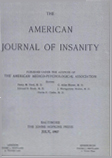MENTAL CHANGES IN CHOREA MINOR
Abstract
1. Chorea minor was studied with special interest in its mental manifestations. Granted that we are dealing with the same fundamental syndrome, nevertheless for convenience in diagnosis and prognosis it was found helpful to classify our cases in 3 groups: I. Chorea with severe psychosis; II. Chorea with mild mental disturbance; III. Chorea without gross mental changes.
2. The mental changes in chorea are closely connected with disturbances in impulse. Emotional instability such as increased laughing and crying predominate. In the milder and uncomplicated cases there are no serious disturbances in thinking or in orientation; although behavior disturbances may offer a serious problem. In the severe cases, the hyperkinesis and akinesis influence thinking. Hallucinations and delusions often are present. In the more severe cases confusion and disorientation may supervene.
3. The motility disturbances of chorea and schizophrenia are occasionally similar but their respective mental pictures are distinct.
4. In these patients with severe mental symptoms atypical motor signs such as flaccidity, tonic and rhythmical phenomena were observed.
5. Severe mental symptoms were a grave prognostic sign and seen particularly in older patients.
6. Fever therapy did not prove beneficial in chorea with severe psychosis but was helpful in patients with minor mental symptoms and advantageous in the treatment of behavior problems associated with chorea.
I am indebted to Drs. Karl M. Bowman and Charles Hendee Smith, Directors, respectively, of the Psychiatric and Pediatric Divisions, Bellevue Hospital, for permission to use the clinical material presented and to Dr. Douglas Symmers, Director of Laboratories of New York City, for permission to use a pathological report.
I wish to thank Drs. Paul Schilder, Normal Jolliffe, Lewis D. Stevenson and Lauretta Bender for their aid.
Access content
To read the fulltext, please use one of the options below to sign in or purchase access.- Personal login
- Institutional Login
- Sign in via OpenAthens
- Register for access
-
Please login/register if you wish to pair your device and check access availability.
Not a subscriber?
PsychiatryOnline subscription options offer access to the DSM-5 library, books, journals, CME, and patient resources. This all-in-one virtual library provides psychiatrists and mental health professionals with key resources for diagnosis, treatment, research, and professional development.
Need more help? PsychiatryOnline Customer Service may be reached by emailing [email protected] or by calling 800-368-5777 (in the U.S.) or 703-907-7322 (outside the U.S.).



